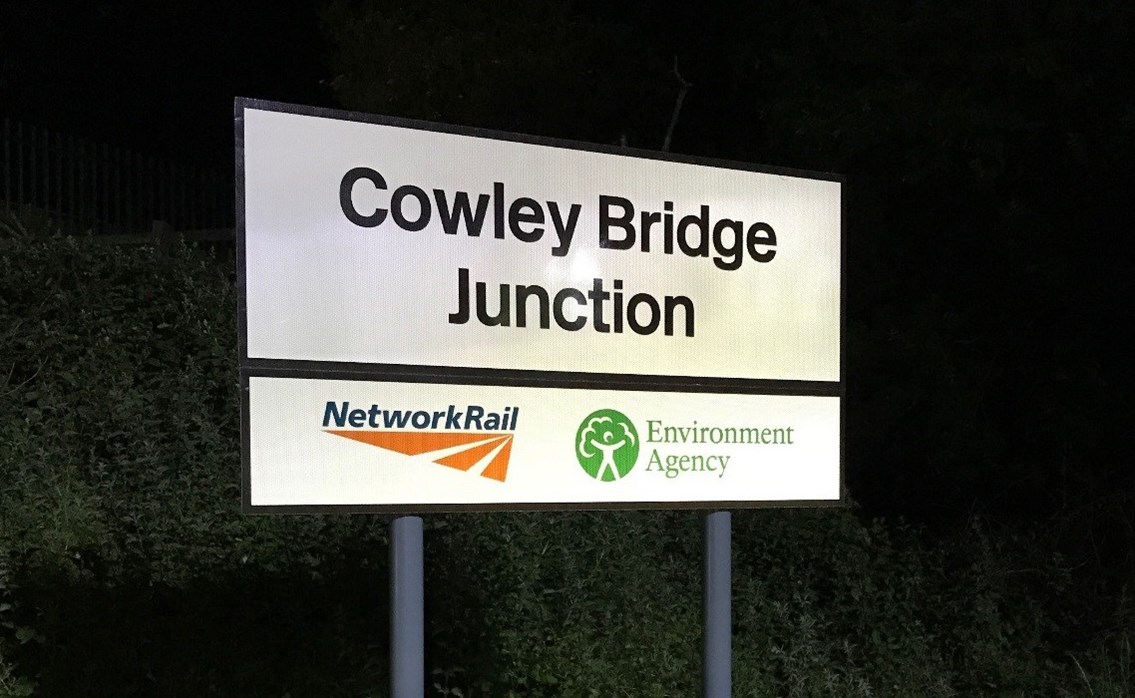Monday 8 Jun 2020
Network Rail brings new flood defence barrier into use to stop flooding north of Exeter
- Region & Route:
- Wales & Western: Western
- | Wales & Western
Network Rail has installed a new flood defence barrier to protect passenger journeys from being disrupted by flooding to the north of Exeter.
The barrier, which was installed at the end of May, is part of a £26.5 million programme to reduce the regular disruption to long distance and local (Tarka Line) rail services, between the city of Exeter and the town of Barnstaple that is often caused by flooding of the River Exe around the Cowley Bridge Junction area.
The new metal flood defence barrier can be quickly assembled across the railway when poor weather is forecast and stops the flow of the flood water. When not in use, the barrier remains largely unseen, which means the local landscape remains largely unchanged.
The first part of this project was the installation of large flood drains in 2018, which allow water to drain underneath the railway and safely away from the railway.
Mike Gallop, Network Rail’s Route Director for the Western route, said:
“We are delighted to be further improving the reliability of journeys for passengers travelling to and from the south west. While we can’t control the weather, we can put in place measures that will help protect the railway from flooding and services not running.
“The area north of Exeter regularly floods and stops rail services running between Devon, Cornwall and the rest of the country. It’s vital for passengers, businesses and the regional economy that we prevent this from happening. The new flood barrier is one of the latest measures we’ve put in place, working with the Environment Agency, to reduce this from happening last year. In February this year, we experienced an extreme amount of wet weather and we were able to see that these measures are already starting to help.”
Simon Dart, Flood and Coastal Management Advisor for the Environment Agency, added:
“We were keen to support Network Rail’s project that helps protect this major route from flooding. The barrier is a part of the new Exeter flood defence scheme and helps to better protect the St David’s area of Exeter, including hundreds of homes and commercial development, plus strategically important roads and infrastructure.”
Contact information
Passengers / community members
Network Rail national helpline
03457 11 41 41
Latest travel advice
Please visit National Rail Enquiries
Journalists
Steven Crane-Jenkins
Media Relations Manager
Network Rail (Wales and Borders)
07732 643228
Steven.Crane-Jenkins@NetworkRail.co.uk
About Network Rail
We own, operate and develop Britain's railway infrastructure; that's 20,000 miles of track, 30,000 bridges, tunnels and viaducts and the thousands of signals, level crossings and stations. We run 20 of the UK's largest stations while all the others, over 2,500, are run by the country's train operating companies.
Usually, there are almost five million journeys made in the UK and over 600 freight trains run on the network. People depend on Britain's railway for their daily commute, to visit friends and loved ones and to get them home safe every day. Our role is to deliver a safe and reliable railway, so we carefully manage and deliver thousands of projects every year that form part of the multi-billion pound Railway Upgrade Plan, to grow and expand the nation's railway network to respond to the tremendous growth and demand the railway has experienced - a doubling of passenger journeys over the past 20 years.
Follow us on Twitter: @networkrail
Visit our online newsroom: www.networkrailmediacentre.co.uk

